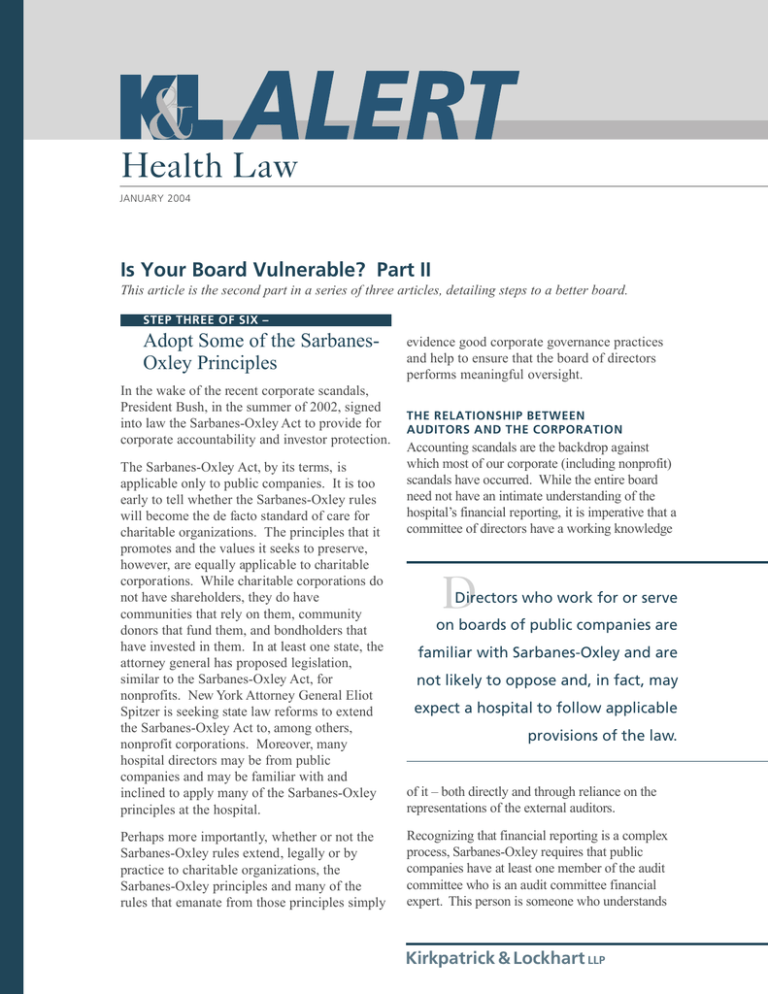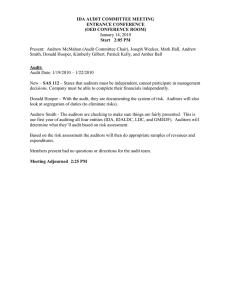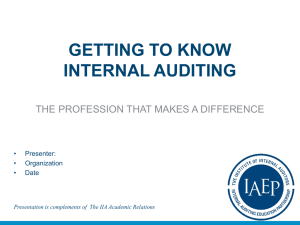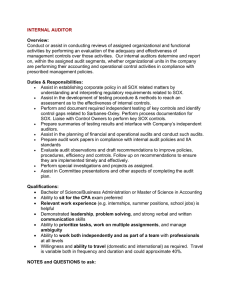Health Law Is Your Board Vulnerable? Part II Oxley Principles
advertisement

Health Law JANUARY 2004 Is Your Board Vulnerable? Part II This article is the second part in a series of three articles, detailing steps to a better board. STEP THREE OF SIX – Adopt Some of the SarbanesOxley Principles In the wake of the recent corporate scandals, President Bush, in the summer of 2002, signed into law the Sarbanes-Oxley Act to provide for corporate accountability and investor protection. The Sarbanes-Oxley Act, by its terms, is applicable only to public companies. It is too early to tell whether the Sarbanes-Oxley rules will become the de facto standard of care for charitable organizations. The principles that it promotes and the values it seeks to preserve, however, are equally applicable to charitable corporations. While charitable corporations do not have shareholders, they do have communities that rely on them, community donors that fund them, and bondholders that have invested in them. In at least one state, the attorney general has proposed legislation, similar to the Sarbanes-Oxley Act, for nonprofits. New York Attorney General Eliot Spitzer is seeking state law reforms to extend the Sarbanes-Oxley Act to, among others, nonprofit corporations. Moreover, many hospital directors may be from public companies and may be familiar with and inclined to apply many of the Sarbanes-Oxley principles at the hospital. Perhaps more importantly, whether or not the Sarbanes-Oxley rules extend, legally or by practice to charitable organizations, the Sarbanes-Oxley principles and many of the rules that emanate from those principles simply evidence good corporate governance practices and help to ensure that the board of directors performs meaningful oversight. THE RELATIONSHIP BETWEEN AUDITORS AND THE CORPORATION Accounting scandals are the backdrop against which most of our corporate (including nonprofit) scandals have occurred. While the entire board need not have an intimate understanding of the hospital’s financial reporting, it is imperative that a committee of directors have a working knowledge D Directors who work for or serve on boards of public companies are familiar with Sarbanes-Oxley and are not likely to oppose and, in fact, may expect a hospital to follow applicable provisions of the law. of it – both directly and through reliance on the representations of the external auditors. Recognizing that financial reporting is a complex process, Sarbanes-Oxley requires that public companies have at least one member of the audit committee who is an audit committee financial expert. This person is someone who understands Kirkpatrick & Lockhart LLP accounting principles and financial statements, who can assess the application of those principles, who has experience preparing financial statements, who understands internal controls and financial reporting, and who understands audit committee functions. Having an audit committee financial expert helps to ensure that the audit committee is competent to question the auditors and management, to understand and evaluate the responses, to recognize early warning signs, and is not entirely dependent upon the outside auditors raising a red flag. e Sarbanes-Oxley also promotes a direct relationship between the auditors and the audit committee of the board so that all significant conversations regarding the audit and the treatment of certain funds are not solely between the auditors and management, with the final audit report to the board having been “scrubbed” by management. In order to fulfill its function in a meaningful way (and for its reliance on the auditors to be well-placed), the audit committee needs to have the direct perspective of the auditors as to the quality of the company’s accounting principles, the auditors’ views about significant matters that were the subject of consultation between management and other accountants, disagreements with management over the application of accounting principles, and the like. In addition, in an effort to limit the influence of management on the audit process, Sarbanes-Oxley makes clear that the board (through the audit committee) has the responsibility for retaining and dismissing outside auditors. The board should be actively involved in the audit firm selection process and the board’s function should not simply be to approve management’s recommendation. AUDITORS AND ONLY AUDITORS Another key principle of Sarbanes-Oxley that translates well to nonprofits is that auditors should be auditors and exclusively auditors. Audit functions and consulting functions too often are at odds with each other. Directors rely on the independence and the competence of the corporation’s outside auditors, and directors should be able to rely on their independence and their competence. The Pennsylvania Nonprofit Corporation Law affirms that directors are entitled 2 to rely on the auditors and the reports they produce – as long as they have no reason not to believe this reliance is warranted. One way to help ensure that this reliance is wellplaced is to make certain that the outside auditors have no other role that could create a conflict for the performance of the audit function. Auditors should not be in a position where they: (a) audit their own work; (b) perform management functions; or (c) act as an advocate for the corporation. For example, an accounting firm that performs audit work should not be designing compensation packages for management and should not be performing consulting work that involves them acting as an advocate. ACTION ITEMS: 1. Identify at least one financial expert to serve on the finance/audit committee and make sure that individual is comfortable with the designation. If your board does not have any director who qualifies as an audit committee financial expert, make it a priority to recruit such an individual. 2. Make certain that the audit committee has the responsibility (not just on paper, but in actual practice) for retaining and terminating the external auditors. 3. Promote a direct line of communication between the audit committee members and the auditors, without management in the middle — provide the audit committee members with the opportunity to question the auditors without members of management present (especially as to whether the auditors would have reported the financials in any different manner and whether there are any warning signs or financial concerns that the committee should be focused on during the next 12 months). 4. Adopt a resolution prohibiting your auditors from performing any work for your organization that is unrelated to the audit without the specific approval of the audit committee and, perhaps, the entire board. KIRKPATRICK & LOCKHART LLP HEALTH LAW ALERT STEP FOUR OF SIX – Make Sure Your Baseline Systems Are Functional Every hospital board approves the medical staff appointments and reappointments. This is generally a rubber-stamp approval based on the recommendation of the credentialing committee. But how do you know that the credentialing committee is doing the right things? The board is ultimately responsible for ensuring that its medical staff is qualified. Every few years, it makes sense for the board, management, and the medical staff leadership to conduct a review to make sure that credentialing policies and procedures are sufficient. The board relies on its procedures to assure itself of H Hospitals seldom review their systems on a retrospective basis. If doctors do it, hospitals should do it too. the integrity of the medical staff. In order to justifiably rely on the procedures, the board needs to have done its homework to know that the procedures are adequate. A baseline review of policies and procedures in other high risk areas may also make sense. For example, are donor funds being spent appropriately? Have a third party conduct a review of donor instruments and the procedures for utilizing donor funds for projects to ensure compliance and the integrity of your procedures. It takes a long time to build up trust in the community – one newspaper article about a donor who is unhappy that funds have been used inappropriately can undo a lot of hard work. Physician relationships are another area of concern. Are your contractor relationships, employment relationships, practice purchases, practice disposition strategies, and recruitment deals compliant with all of the regulatory guidelines? With increasing regulatory scrutiny JANUARY 2004 and vague regulations, it is important to periodically review your organization’s relationships with key physician groups – not only so the corporation can clean up practices if you need to, but also because a review evidences a commitment to compliance. This review should be conducted by legal counsel so that the work product can be protected under an attorney-client privilege. Finally, make sure that your corporate structure exists in reality as you believe it exists. Most hospital systems have evolved over decades with different administrations building on the corporate structure described to them. And, often, this belief is different from reality. Make sure that your system’s legal corporate structure reflects actual operations, that your organizational documents (articles and bylaws) are consistent with each other and reflect the reality of how they function, that your tax exemption information is correct, that all necessary corporate and IRS filings have been made, and that corporations that are no longer functional have been dissolved appropriately. It is very common to find that there are more corporations recorded with the State Corporation Bureau’s database than management may be aware of. Moreover, entities that historically have been thought of as corporations are actually found to be partnerships, names of entities have changed, but not been recorded, filings have lapsed, and so forth. ACTION ITEMS: 1. Select an area for review and have a consultant or your internal auditors report its or their findings and recommendations to the board (or the compliance committee). Start with confirming the accuracy and appropriateness of your corporate structure. These external reviews will give you peace of mind and objective evidence that management and the board are entitled to rely on the structure, processes, and procedures they have put into place. JUDY J. HLAFCSAK jhlafcsak@kl.com 412.355.8920 Kirkpatrick & Lockhart LLP FOR MORE INFORMATION, please contact one of the following K&L lawyers: Boston Harrisburg Miami Newark Pittsburgh Washington R. Bruce Allensworth Edward J. Brennan, Jr. Ruth E. Granfors Raymond P. Pepe Marc H. Auerbach William J. Spratt, Jr. Stephen A. Timoni Judy J. Hlafcsak Edward V. Weisgerber Alan J. Berkeley ballensworth@kl.com ebrennan@kl.com rgranfors@kl.com rpepe@kl.com mauerbach@kl.com wspratt@kl.com stimoni@kl.com jhlafcsak@kl.com eweisgerber@kl.com aberkeley@kl.com 617.261.3119 617.951.9143 717.231.5835 717.231.5988 305.539.3304 305.539.3320 973.848.4020 412.355.8920 412.355.8980 202.778.9050 ® Kirkpatrick & Lockhart LLP Challenge us. ® www.kl.com BOSTON ■ DALLAS ■ HARRISBURG ■ LOS ANGELES ■ MIAMI ■ NEWARK ■ NEW YORK ■ PITTSBURGH ■ SAN FRANCISCO ■ WASHINGTON ......................................................................................................................................................... This bulletin is for informational purposes and does not contain or convey legal advice. The information herein should not be used or relied upon in regard to any particular facts or circumstances without first consulting a lawyer. 4 © 2004 KIRKPATRICK & LOCKHART LLP. ALL RIGHTS RESERVED. KIRKPATRICK & LOCKHART LLP HEALTH LAW ALERT







